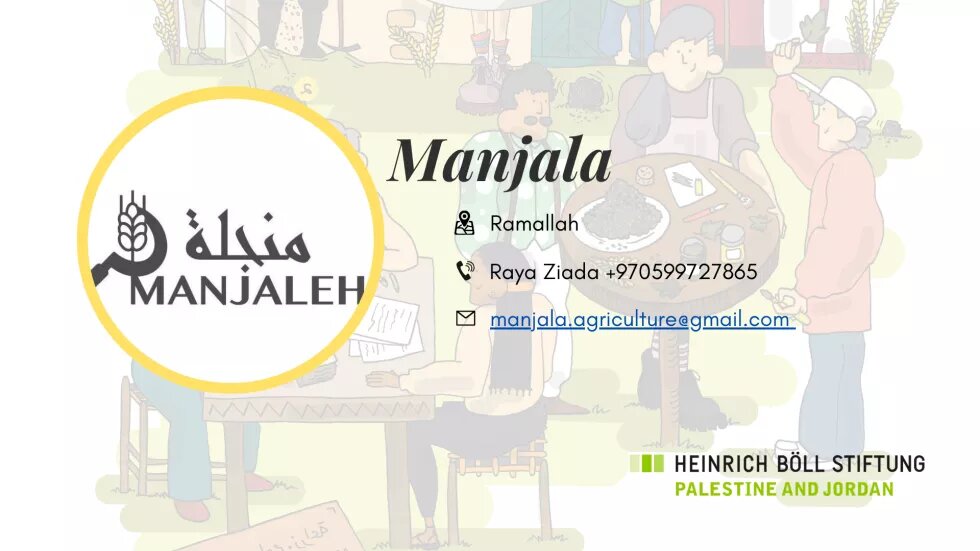Email: manjala.agriculture@gmail.com
Facebook: Manjala منجلة
Instagram: manjala_agricultural

“The idea of Manjala (which means sickle) arose when the members of the initiative realized the presence of a real crisis in the agricultural sector, in food sovereignty and the relationship with the land among the youth in Palestine. The main motivation behind the establishment of this initiative in 2017 was to strengthen people’s bonds to the land and soil. The founders, Raya Ziada and Yara Al-Dawani, were determined to reach out and motivate the youth and children to return to the main component of their identity and sense of belonging to the place. As young women, they believe that agriculture and land represent philosophical concepts based on agriculture of liberation and daily practices. Together with their fellow comrades, they aspire to create an agroecological movement that depends on production and food sovereignty, which are the cornerstone to ending economic dependency and building an economy of resistance.
Manjala’s first experience was the launching of the first Palestinian agricultural (environmental) camp in 2017, which targeted young women and men from different geographical areas. This agricultural camp was held in the mountains of Ein Qinya village, away from all features of the fast paced lifestyle, without Telephones or lights, in order to return to the origin, the soil. Participants learned about environmental agriculture through both theory and practice. They learned about ways of making different types of compost and participated in discussions on topics like water resource issues and global warming.
For Manjala, it is also important to reach the heart of the city and its concrete blocks, where capitalism and neoliberalism cast a grey shadow over all that is green and brown. The idea was to create a community garden through an action known as “guerrilla gardening” by targeting a neglected area and turning it into a community space. A garden was set up in a neglected area in the Khalil Sakakini Street in Ramallah, where the garbage was cleaned, trees were planted and vegetables were grown. The neighborhood community reacted positively to the idea.
This activity and the idea behind it tackle issues of urban public space and debunks the claim made by states that “there is no space for agriculture” when in reality agriculture is possible everywhere.
In 2018, in partnership with the Palestinian Agroecological Forum (PAF), Manjala Initiative began planning the launch of a national campaign for the rehabilitation of water springs that have in recent years dried out. Mazare’ An-Nubani village was selected to become a model for implementing these water harvesting actions. Specifically, the campaign worked to apply rainwater harvesting through techniques such as increasing the vegetation cover and the construction of small crescent dams to hold water longer in the land, all done with the efforts of young men and women. Raya and Yara are determinted to continue the work in the coming years “out of the conviction that wewill not let the occupation, which already controls our water resources, to conquer our imagination as well. We will continue to collect rainwater and irrigate our plants and trees.”
In addition to this, Manjala has implemented agricultural and cultural activities for children, integrating art and using creative means to teach children how to connect with nature and land. One example of these activities was “The Insect Hotel”, which was carried out in both the Khalil Sakakini Cultural Centre and the Palestinian Museum, as well as other activities for teaching the principles of agroecology.
In the coming period, Manjala Initiative will work under the grant of the Palestinian Ruwa Fund to establish the first environmental farm in Al Wallajeh village and will organize the second agricultural farm camp in Mazare’ An-Nubani area. Since Manjala Initiative is a voluntary group, its success is only possible with collective communal work, restoring the spirit of volunteerism among Palestinian youth. The partnerships they have with likeminded initiatives seek to create an agricultural reality away from the colonial and capitalist paradigm. To learn more about Manjala, contact them and join their volunteering opportunities to be present in the land and for the land.
____________________________________________________
Volunteering Opportunities: pre-coordination through the Facebook page for Volunteering Opportunities.